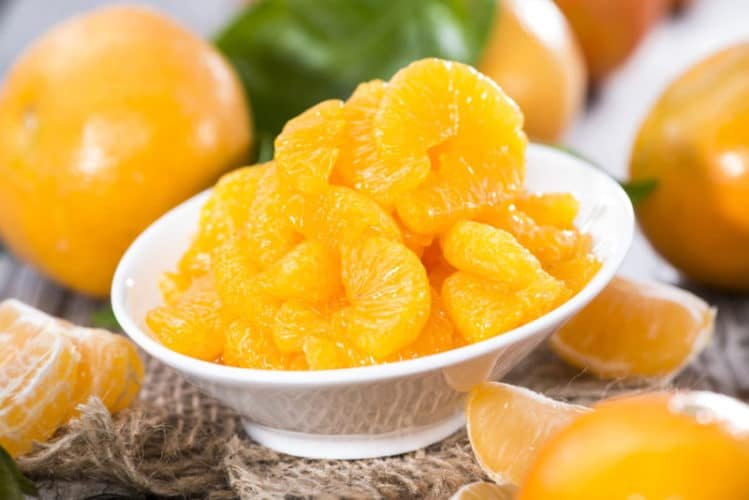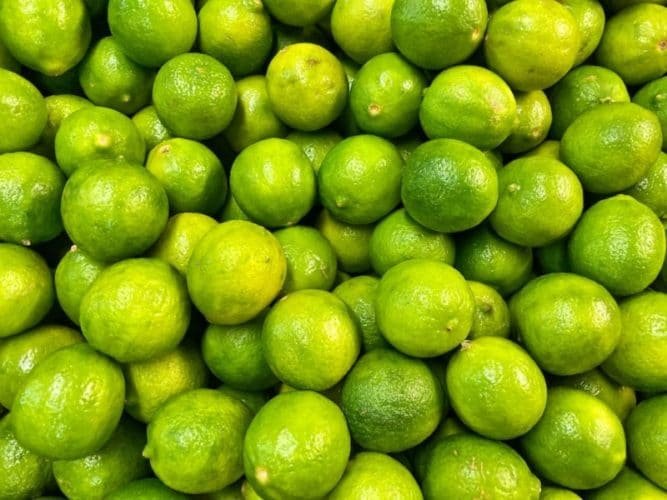How to Freeze Mandarins
Freezing mandarins is relatively easy to do, but you shouldn’t expect to use frozen mandarins in the same way you would fresh. The texture changes considerably, and thawing them out and eating raw isn’t recommended.
How to Freeze Tinned Mandarins
When it comes to freezing tinned mandarins, you might find there is even more texture change than when freezing fresh mandarins. This is because of the high water content of the fruit and due to them already being processed.
Because of this, you won’t be able to freeze them as long without them degrading. You should be aiming to use them up within two to three months from the date of freezing.
- Drain
Drain the mandarin segments completely and allow them to air dry for a little while. - Flash Freeze
Grab a baking tray and lay out the mandarin segments onto it. You may want to put down some parchment paper first to stop them from sticking to the baking tray. Layer out the segments so that they are not touching each other. Pop the baking tray into the freezer for a couple of hours. - Bag Up
When the segments are frozen, you can take the baking tray and transfer them into a freezer bag. - Seal
Seal the bag and then add a label with the date and contents. - Freeze
Put this into the freezer until you need some frozen mandarins.

How to Freeze Fresh Mandarins
Fresh mandarins can be frozen whole or segmented, and which method you choose will depend on how you want to use them. A whole frozen mandarin can be eaten frozen as an icy treat, but it might be a little much in one go. The method is the same whether you freeze a whole mandarin or segments, so let’s look at how.
- Prepare
Peel and wash your mandarin. Choose whether to leave them whole or segment the mandarins. - Flash Freeze
You will need a baking tray with a sheet of parchment paper. Lay out the whole mandarins or segments onto the baking tray so that none of the mandarins is touching. Put this into the freezer. Keep the baking tray flat, so none of the mandarins falls off. - Wait
Leave the mandarins in the freezer for about two hours until the mandarins are frozen. - Bag Up
Once the mandarins are frozen, you can take the baking tray out of the freezer and transfer them into a freezer bag. - Seal
Seal the bag and keep it as airtight as possible. - Freeze
Label the bag with the date and contents and put it in the freezer.
How to Freeze Mandarin Juice
If you have mandarin juice that you don’t want to waste, then there is good news. You can freeze it!
- Pour into Container
Put the mandarin juice into a suitable freezer container. It needs to be a container with a lid that seals tightly. - Don’t Overfill
Make sure there is a gap left at the top, and you don’t overfill the container so the mandarin juice can expand as it freezes. - Seal
Put the lid onto the container and label it with the date and contents. - Freeze
Put this into the freezer and freeze until you need it.
If you know, you’ll only need a little mandarin juice at a time, then try using an ice cube tray for freezing the juice.
3 Tips for Freezing Mandarins
Now you know how to freeze them, we’ve got our 3 top tips which we strongly recommend following when freezing mandarins to have the best results:
- Eat Frozen – Frozen mandarins make a great icy treat. They are best used frozen, and the texture change works well when eaten frozen. It’s a little like eating a fresh sorbet. Delicious and perfect for a warm day.
- Flash Freeze – Using a double freezing method might seem like many steps, but it is well worth it. Freezing mandarin segments on a baking tray and then putting these into a freezer bag once they are frozen means they don’t freeze together into a lump, and you can grab out the exact number you need.
- Protect from the Air – The best way to ensure your mandarins taste fresh and delicious is to ensure they are kept protected from the air in the freezer. This is why it’s important to fully seal any bag or container before putting it into the freezer. You can help this further by squeezing out any excess air in the bag before sealing it.
How Long Can You Freeze Mandarins?
Tinned mandarins can be frozen for two to three months. Unfortunately, they don’t last as long as fresh mandarins in the freezer.
If you are freezing fresh mandarins, you can keep them in the freezer for up to ten months. Perfect for ensuring you don’t let any mandarin go to waste.
You Can Freeze Mandarins for up to 10 Months
How Do You Defrost Mandarins?
We wouldn’t recommend that you defrost mandarins at all. They change texture considerably when frozen, so if you tried to thaw them out, you might find that they end up too mushy and soft to eat.
This won’t matter too much if you add them into a recipe and can be done by popping them into the fridge to defrost overnight.
When it comes to eating your mandarins, keep them frozen. They make a great treat, and you can throw them into smoothies to add flavour and texture before blending.
You can also use a frozen mandarin segment or two in a glass of water instead of ice. It adds a refreshing citrus flavour whilst keeping your drink cool.
Can You Refreeze Mandarins?
Unfortunately, no, you can’t refreeze mandarins. They will change in texture and quality too much and could become inedible.
Do Mandarins Freeze Well?
Whether or not mandarins freeze well comes down to how you plan to use them. If you want to eat them raw and add them to fruit salads as you would with fresh mandarins, then, unfortunately, no mandarins don’t freeze well for this purpose.
However, if you plan to use the mandarins frozen or in recipes, then the texture and structure change doesn’t matter so much, and this can even improve the mandarins!
Related FAQs
If you’ve still got questions about freezing mandarins or mandarins in general, then these may help:
Can You Freeze Tangerines?
(And satsumas)? Tangerines, satsumas, clementines and other orange citrus fruits – even oranges – can be frozen in the same way as mandarins. The key element when freezing any fruit is to ensure it is airtight.
Can You Freeze Citrus Fruit?
As well as mandarins, other citrus fruits can also be frozen in the same way. This includes lemons and limes.



